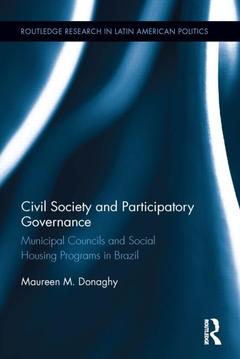Civil Society and Participatory Governance Municipal Councils and Social Housing Programs in Brazil Routledge Studies in Latin American Politics Series
Auteur : Donaghy Maureen M.

Democratic institutions should promote accountability of government officials to the needs of citizens. Civil society plays a role in exposing corruption as well as in communicating the needs of low-income residents to officials. Neither the institutions of representative democracy nor the presence of civil society, however, appears to automatically guarantee adoption of social benefits for the poor. Can democratic institutions be created to address social challenges?
Scholars, development practitioners, donors, and activists propose participatory governance institutions as mechanisms to create accountability and responsiveness through a public forum incorporating civil society. To date, however, little comparative research exists to confirm whether these institutions do influence adoption of social policies. Maureen M. Donaghy remedies this gap by combining data from Brazil?s 5,564 municipalities with extensive fieldwork from five Brazilian cities to test whether participatory municipal housing councils are associated with an increase in adoption of social housing programs to benefit the poor. Housing represents an issue of critical importance in Brazil and other developing countries where large populations reside in informal settlements in unsafe and insecure conditions.
Civil Society and Participatory Governance is the first book of its kind to move the conversation beyond budgeting to other social policy areas, providing fresh theoretical and empirical insights to demonstrate that participatory governance institutions are effective mechanisms to coordinate government officials and civil society to alter policy-making.
1: Introduction 2: Housing Policy as Critical Challenge for Development and Democracy 3: The Effect of Municipal Housing Councils on Policy Outcomes 4: Civil Society Density, Participatory Governance, and Policy Outcomes 5: Pathways to Participatory Governance: Policy-Making in Brazil’s Municipal Housing Councils 6: The Creation Effect: Evaluating Commitment in Participatory Governance Institutions 7: Longevity in Participatory Governance Institutions: São Paulo’s Municipal Housing Council at 10 8: Conclusion: Can Democracy Remedy Social Challenges? Findings on the Effect of Participatory Governance Institutions
Maureen M. Donaghy is Assistant Professor at Rutgers University-Camden. Her research and teaching interests focus on development and civil society with an emphasis on participatory governance, urban politics and Latin America.
Date de parution : 03-2013
15.2x22.9 cm
Date de parution : 05-2015
15.2x22.9 cm
Thème de Civil Society and Participatory Governance :
Mots-clés :
Participatory Governance; Civil society; Brazil Housing Policy; Public Policy; Social Policy; Development; Socio-economic variables; Robert Putnam; Municipal Housing Councils; São Paulo; Santo André; Municipalities; Salvador; Civil society-state dynamics; National System for Social Housing (SNHIS); Recife; Curitiba; Institutional design; Comparative Politics; Latin American Politics; Urban Politics; Participatory budgeting process; Participatory Governance Institutions; Ta Te; Pe Rc; Municipal Housing Fund; Social Housing Programs; Brazilian Government; Civil Society Density; Large Public Housing Complexes; Housing Councils; Program Adoption; Councils Created; Participatory Institutions; PT Administration; Civil Society Commitment; Strong Civil Society; Provide Construction Materials; Raquel Rolnik; Brazilian Municipalities; Housing Programs; MST; Federal Transfers



